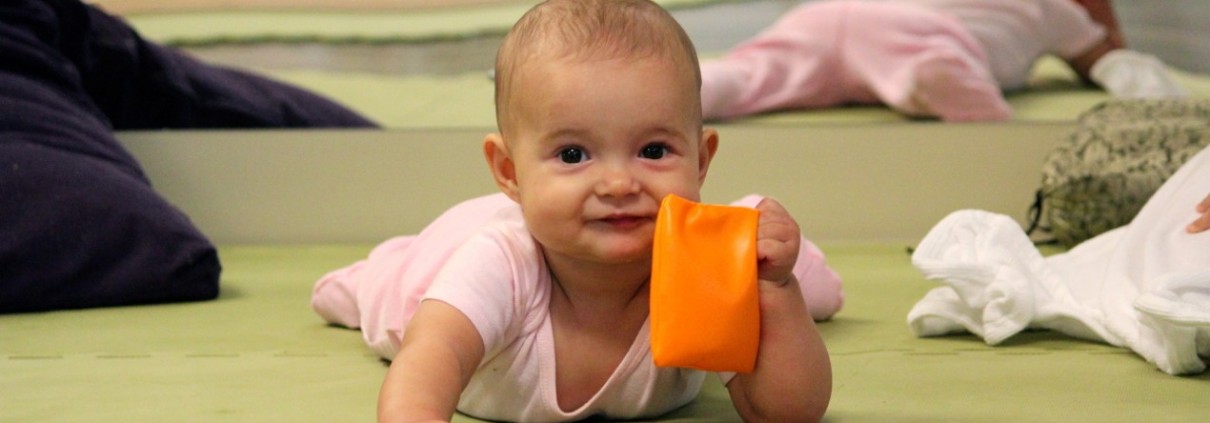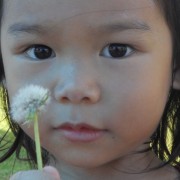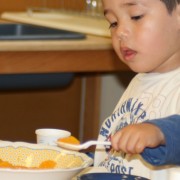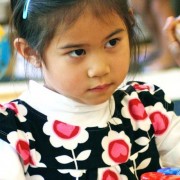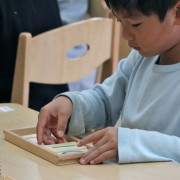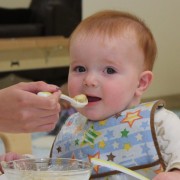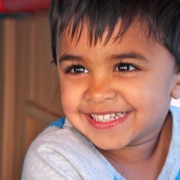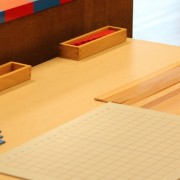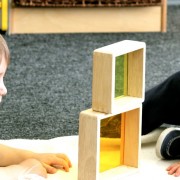Five differences between LePort’s Montessori infant program and traditional daycare
Although Montessori schools serve a daycare market, we do not think of our Montessori infant program as a type of daycare. The difference is just too significant.
If you visit any mass-market daycare chain and then spend 20 minutes observing in our Montessori infant rooms, you’ll vividly see and feel the difference between the two. If you can’t make that comparison to daycare yourself right now (or are just struggling to find words to capture the difference you experienced!) here are five things that set the LePort Montessori infant program apart from typical daycare:

- A carefully prepared Montessori home-like environment, not a daycare center. At most daycare centers, plastic materials dominate, from toys to furniture, because they happen to be easy and quick to clean. We want more for your child: our infant environments are beautiful by design. They are open, bright spaces, with high-quality, wooden furniture and comfortable chairs for teachers to snuggle with babies. You’ll see soft floor mats, lots of pillows of different shapes and sizes, and soft sheepskins to rest on. There’s art on the walls, at baby’s eye level, and mirrors along the floor. On first sight, this room may look more like your living room than a daycare center. And shouldn’t it? LePort’s Montessori program will be your baby’s home way from home, after all!
- Love and respect for each individual child and family. Often, daycare centers feel too regimented: strict sleep schedules, mass-feedings in high chair line-ups, and parents not welcome at school. At LePort, we treasure each baby as a unique individual and do everything we can to tailor the routine of feeding, active time, and nap to his needs. We never confine your child to a high chair; instead, we cuddle with him in comfortable seats with a bottle, until he’s ready and excited to transition him to a low table and chair, where he can participate in eating with his own spoon. And, of course, moms are always welcome to join their child for a mid-day breastfeeding break!
- Freedom to explore at their own pace: a follow-the-child approach. Walkers, cribs, play pens: in many daycare settings, children spend much time in these and other containers. At LePort, in contrast, our mission is to liberate your child. We recognize that being encouraged to move is critical for infant development. Soft floor mats in front of mirrors encourage tummy time and self-discovery. Low bars mounted to the wall and soft furniture entice children to pull up. Stairs with low steps, a railing and a slide just call for practice climbing up and down. Because of our individualized approach, each child progresses through the stages of movement—rolling over, crawling, cruising, walking—at his or her own pace. In contrast to most typical daycare centers, we never force 12 infants to conform to a group, not for feeding, not for sleeping, and not for anything else. As part of our overall follow-the-child approach, we customize your child’s activities to his or her unique needs. Socialization, in our environment, happens naturally; being with other little people thus is a joyful experience for your baby, rather than something that becomes associated with forced group activities for which babies just aren’t developmentally ready.
- Nurturing guidance for growing brains. A baby’s brain grows more during the first two years of life than any other subsequent two-year period. Our trained teachers recognize that education starts at birth, and work to provide an environment that will foster the child’s natural process of exploration. From beautiful, captivating mobiles for babies to observe, to immaculate materials on low shelves demonstrating simple cause-effect relationships, our environment and activities are carefully designed to facilitate and encourage self-initiated learning, exploration, and growth.
 The first two years of life are also a “sensitive period” for order. Babies have a natural need to follow routines, to understand sequences, to know where things in their environment belong. As Montessori educators, we actively support your baby’s need for order: there is a special place for each material, and even children as young as 14 months delight in being able to put things back where they belong on the low, open shelves (something they rarely can do in other daycare settings, which often are cluttered, and have toys stored by staff in boxes or out of babies’ reach.) Our teachers are also masters at stimulating your baby’s language development. As Montessori educators, we know that the “sensitive period” for language acquisition starts at birth. Our teachers provide vocabulary at timely opportunities in response to their emerging interests: we observe and identify what your child focuses on (a blue mobile, a wooden chair, a soft, green, furry ball), and give her the language that goes with her interest. This responsive, individualized approach to fostering language skills has been shown to advance toddlers’ language development by up to an astounding six months!
The first two years of life are also a “sensitive period” for order. Babies have a natural need to follow routines, to understand sequences, to know where things in their environment belong. As Montessori educators, we actively support your baby’s need for order: there is a special place for each material, and even children as young as 14 months delight in being able to put things back where they belong on the low, open shelves (something they rarely can do in other daycare settings, which often are cluttered, and have toys stored by staff in boxes or out of babies’ reach.) Our teachers are also masters at stimulating your baby’s language development. As Montessori educators, we know that the “sensitive period” for language acquisition starts at birth. Our teachers provide vocabulary at timely opportunities in response to their emerging interests: we observe and identify what your child focuses on (a blue mobile, a wooden chair, a soft, green, furry ball), and give her the language that goes with her interest. This responsive, individualized approach to fostering language skills has been shown to advance toddlers’ language development by up to an astounding six months! - Highly trained teachers, and a ratio that supports lots of individualized attention. We offer a 1:4 ratio of daycare staff to our babies. In our mixed-age (3 month to around 18-24 months) infant rooms, children nap on their own schedule, and typically a few are asleep at any given time.
 Regulations also require daycare staff to have 12 ECUs (early childhood education units.) Often, that’s the extent of the education and training you’ll find at daycare facilities. We again do not think that’s enough! Research shows that the education level and intelligence of your baby’s primary care provider have a huge impact on his intellectual, social and physical development. You know from your experience as a parent that you often need to think on your feet; that parenting is easier if you have a clear idea of your goals, and the approaches to childrearing you want to follow. That’s why each LePort infant room is led by a university-educated teacher who has also completed the rigorous one-year, Assistant to Infancy training at an AMI training center, or an equivalent MACTE-accredited training program. (In some cases, your child’s teacher may not have completed a degree and/or Montessori training program, but instead has been promoted from an assistant position, where they were carefully evaluated on a range of criteria, from expressive vocabulary to genuine warmth and caring for children. As part of their role, they are enrolled in and completing a training program.) Click here to read more about the attributes we look for when hiring your baby’s first teacher.
Regulations also require daycare staff to have 12 ECUs (early childhood education units.) Often, that’s the extent of the education and training you’ll find at daycare facilities. We again do not think that’s enough! Research shows that the education level and intelligence of your baby’s primary care provider have a huge impact on his intellectual, social and physical development. You know from your experience as a parent that you often need to think on your feet; that parenting is easier if you have a clear idea of your goals, and the approaches to childrearing you want to follow. That’s why each LePort infant room is led by a university-educated teacher who has also completed the rigorous one-year, Assistant to Infancy training at an AMI training center, or an equivalent MACTE-accredited training program. (In some cases, your child’s teacher may not have completed a degree and/or Montessori training program, but instead has been promoted from an assistant position, where they were carefully evaluated on a range of criteria, from expressive vocabulary to genuine warmth and caring for children. As part of their role, they are enrolled in and completing a training program.) Click here to read more about the attributes we look for when hiring your baby’s first teacher.

